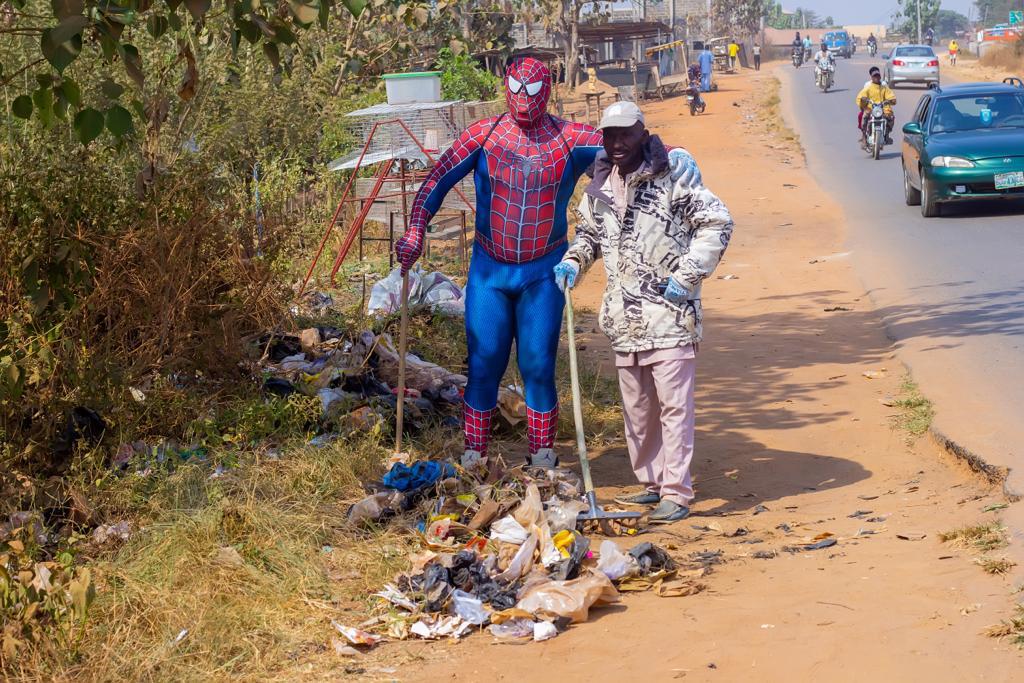“Some friends labelled me a lunatic, and even my family believed I was pushing the boundaries with my newfound commitment to cleaning the environment. In their eyes, I had descended to a level far beneath the respectable man they expected me to be,” Olakunle explained.
Using campaigns and advocacy, Jonathan Olakunle works at helping poor Nigerians enjoy sustainable livelihoods.
“Since 2004, for the past 20 years, I have actively cleaned the environment in Osogbo, Nigeria. I advocate for a clean nation, urging citizens and government stakeholders to join hands and end environmental pollution,” he told Prime Progress.
Through the year, Olakunle has volunteered to clean markets, bus stations, public spaces, and streets, expanding his reach to such Nigerian states as Oyo, Kaduna, Ogun, and Kwara.
“My goal is not only to promote cleanliness but also to contribute towards reducing the impact of climate change,” he said.
Waste pollution and climate change
According to a report by the United Nations Industrial Development Organisation, or UNIDO, Nigeria generates over 32 million metric tonnes of waste every year, with plastic accounting for at least 2.5 million metric tonnes. UNIDO’s report further adds that Nigeria is among the 20 nations contributing 83% of the total volume of land-based plastic waste, which eventually ends up in the oceans.
A World Bank report estimates that 0.51 kilogramme of waste are generated daily by every Nigerian. This figure is expected to rise to 107 million metric tonnes by 2050.
The Yale Center for Environmental Law and Policy provided statistics showing that Nigeria ranks top among 180 countries with the worst waste management practices in the world.
The numbers also showed that Nigeria performed below average with a score of 12.7 out of 100 lower than countries like Seychelles and Equatorial Guinea, with scores of 69.10 and 63.10, respectively.
Yet there are existing laws in Nigeria against pollution. The 1999 constitution, for instance, (as amended), under the fundamental objectives and directive principle of state policy, provides that; “The State shall protect, improve and safeguard the water, air, land, forest, and wildlife in Nigeria.”
Section 21 of the Federal Environmental Protection Agency Act, in the parts related to national environmental standards, states that:
“The discharge in such harmful quantities of any hazardous substance into the air or upon the land and the waters of Nigeria or at the adjoining shorelines is prohibited, except where such discharge is permitted or authorized under any law in force in Nigeria.”
It goes on; “Any person who violates the provisions of the law commits an offence and shall on conviction, be liable to a fine not exceeding N100,000, to imprisonment for a term not exceeding ten years, or to both such fine and imprisonment.”
Spreading a web of change
Despite his efforts at enhancing the environment, not a lot of people took him seriously. His efforts were dismissed as mere joblessness, and he sought to demonstrate the impact he was striving to achieve.
“For 18 years I have been going out to the streets of Osun to clean dirty places and try to propagate the word to every citizen that gives a listening ear. I didn’t get the attention I needed until I came up with the idea of wearing a costume and giving myself the name Nigerian Spiderman.
In his two years of working as the Nigerian Spiderman, Olakunle has gained a growing audience and has equally trained students and people on the impact of a cleaner environment.
“I understand that there are many people who do not know what climate change means. So many of them attribute the impacts they see to a natural phenomenon or to religious and cultural beliefs. But on my part, I try as much as I can to enlighten people about climate change and how keeping a clean environment contributes a great deal to its hazardous impact,” he told Prime Progress.
Olakunle is excited about his work and his new name, which has attracted coverage from a number of local and international media outlets
Also exciting is his goal of a sustainable environment, which he hopes to inculcate in young children in schools. This, Olakunle believes, will produce climate-savvy adults who will be enthusiastic about a clean environment.
“I am a force to reckon with, and I do my work diligently. It is a service I offer to humanity. While I cannot fly like the spiderman in movies, I have my superpower, and I have exercised a great deal over the years, at no cost,” he narrated.

Olakunle believes that it is not enough for Nigeria to travel to the Conference of Parties, the world’s parley on climate change, colloquially known as COP to discuss climate crises. It behoves the country’s leaders to train their citizens on climate change and the disasters it poses to our environment.
“Within the period of 20 years as an environmentalist, I have taught people on how they can turn waste into wealth. I have also supported recycling companies, waste management authorities and private waste management companies with guidance and encouragement on the smart work they carry out,” he said.
Olakunle identifies himself as a “coconut head” dedicated to environmental activism. Even in his 40s, he remains willful in his commitment to making meaningful contribution towards a healthy and green economy.
Jonathan Olakunle, despite facing criticism from friends and family, is committed to environmental advocacy in Nigeria through campaigns and hands-on clean-up efforts. For the past 20 years, he has been actively cleaning public spaces in various Nigerian states and promoting cleanliness as a means to combat climate change.
Nigeria generates over 32 million metric tonnes of waste annually, with inadequate waste management practices. Existing laws, such as the Federal Environmental Protection Agency Act, impose penalties for pollution, but enforcement remains a challenge.
To draw attention to his cause and educate the public, Olakunle adopted the persona of the "Nigerian Spiderman," which has helped him gain a following and train individuals on the importance of a cleaner environment and its impact on climate change. He emphasizes the need for educating citizens about climate change and converting waste into wealth, supporting recycling initiatives and waste management efforts.
Olakunle remains dedicated to fostering a sustainable environment and believes in the importance of instilling this value in young children to create climate-aware future generations.






